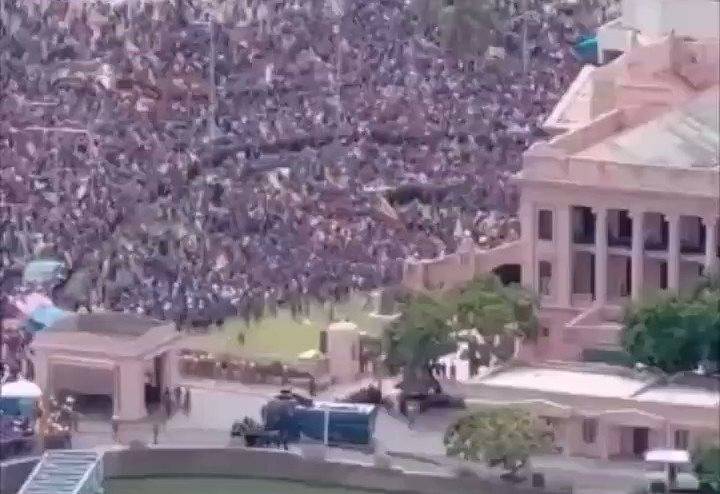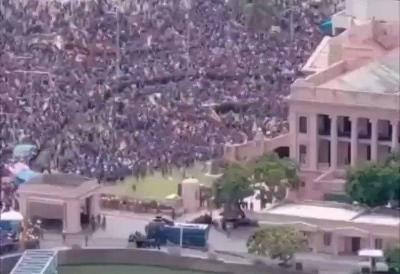Are the Lebanese "a people that didn't take action," or perhaps "a people that hasn't experienced severe hunger yet," to explain the difference in outcomes between the protest movements in Lebanon and Sri Lanka? Excluding the mystery surrounding the "WhatsApp tax" that ignited the uprising on October 17, 2019, the dire facts of poverty, illness, and hunger among large segments of the Lebanese population seem unable to close a single "alley" today. It is quite striking that there is currently no ability to make any difference at the Lebanese level, while the Sri Lankan crisis, akin to the Lebanese one in various aspects, has turned the presidential office of President Gotabaya Rajapaksa into a site occupied by protesters who seized it just days ago, promising not to leave until the current regime resigns.
**Political Aspects**
Of course, we do not deny the political dimensions underlying all uprisings globally, whether peaceful or armed. But why do all these backgrounds fail to enable any Lebanese uprising to achieve its goals? In modern times, the Lebanese have failed to completely eliminate the symbols of the Syrian occupation in the country, despite having revolted and "swept away" all that during February and March 2005. Similarly, in the fall of 2019, the Lebanese also failed to eradicate the symbols of corruption and theft in the country entirely, despite widely exercising their freedoms in expressing the reasons for taking to the streets. Why?
Political dimensions also exist in Sri Lanka; otherwise, we would not have witnessed some reports of grilling and cooking carried out by protesters in the presidential residence, where the "escaped" president had fled from the people's wrath. It is presumed that the people there are poor and unable to find food, so how did they manage to grill and cook in large pots inside the presidential palace, unless there was at least some political support? This was also evident in Lebanon in the fall of 2019, in terms of distributing food to Lebanese "resentful" due to rising prices, poverty, and hunger.
**Reasons for Success**
But why did the Sri Lankans succeed in storming palaces, fortresses, homes, and headquarters, while the Lebanese have been halted at the edges of such actions? Former MP Mohammad Al-Hajjar believes that "the problem of the uprising in Lebanon was the absence of a program, limiting it to disorganized slogans incapable of reaching a goal." He emphasized in a statement to "Akhbar Al-Youm" agency that "the overwhelming majority of Lebanese felt concerned with the uprising. However, some hands interfered, distorting matters and portraying them otherwise, to the extent that the resignation of Prime Minister Saad Hariri turned into what resembled the sole goal of the movements at that time."
**Formation of Groups**
Al-Hajjar pointed out that "Hariri was the first to respond to the people and the uprising by resigning his government and presenting a set of conditions for what future governments should look like in order to implement the reforms the Lebanese want. However, we saw how all movements and demands ended simply because President Hariri removed himself from the governmental arena."
He added: "The spread of the COVID-19 pandemic undoubtedly impacted the uprising. However, we did not feel that the revolution had leadership; instead, we saw it as groups competing and fighting among themselves, allowing the situation to remain as it is, without any change."
**Foreign Interventions**
Al-Hajjar noted that "the Lebanese people may always succeed in finding exits from their current situation. There is no doubt that expatriates abroad represent a positive factor, as they send amounts valued at around 6 or 7 billion dollars annually to Lebanese in the country. However, one cannot rely solely on this, nor can it be said that it is enough, because the continued failure to implement necessary reforms means that things will head towards worse outcomes and dangerous pitfalls."
He concluded: "The 'Taif Agreement' still exists, capable of serving the country, and leading it out of its problems, placing it on the path to sustainability. However, unfortunately, foreign interventions, and some accepting foreign exploitation for this or that purpose, aimed at achieving non-national interests, keep Lebanon’s situation as it is."




